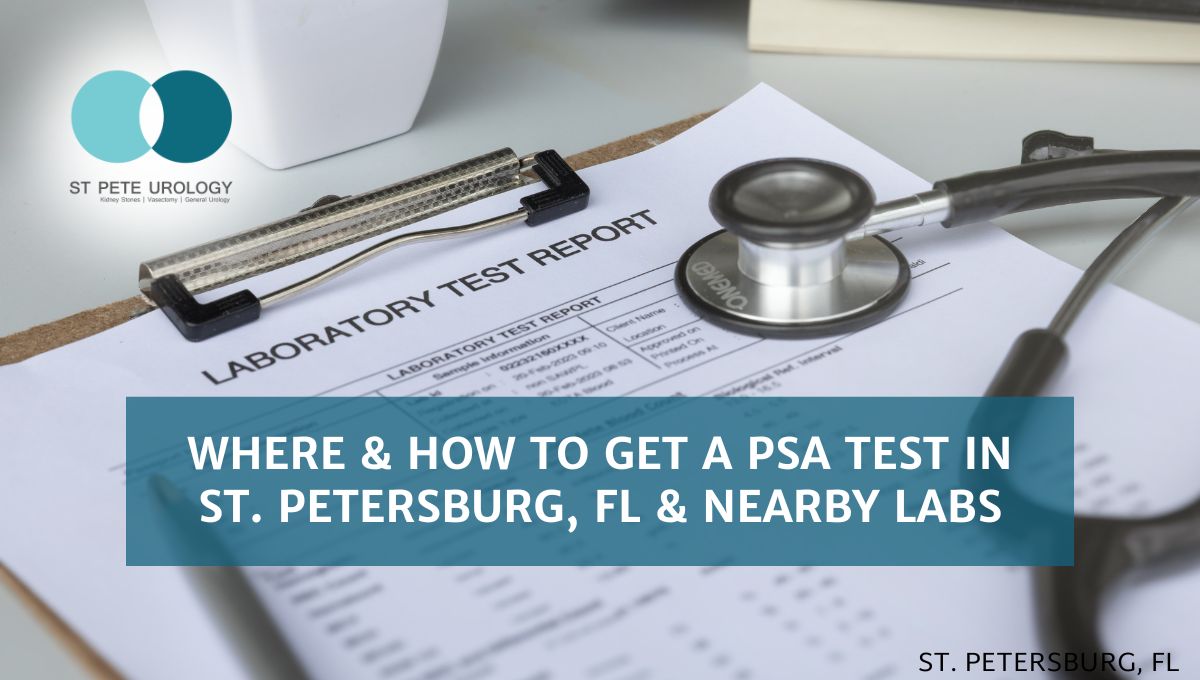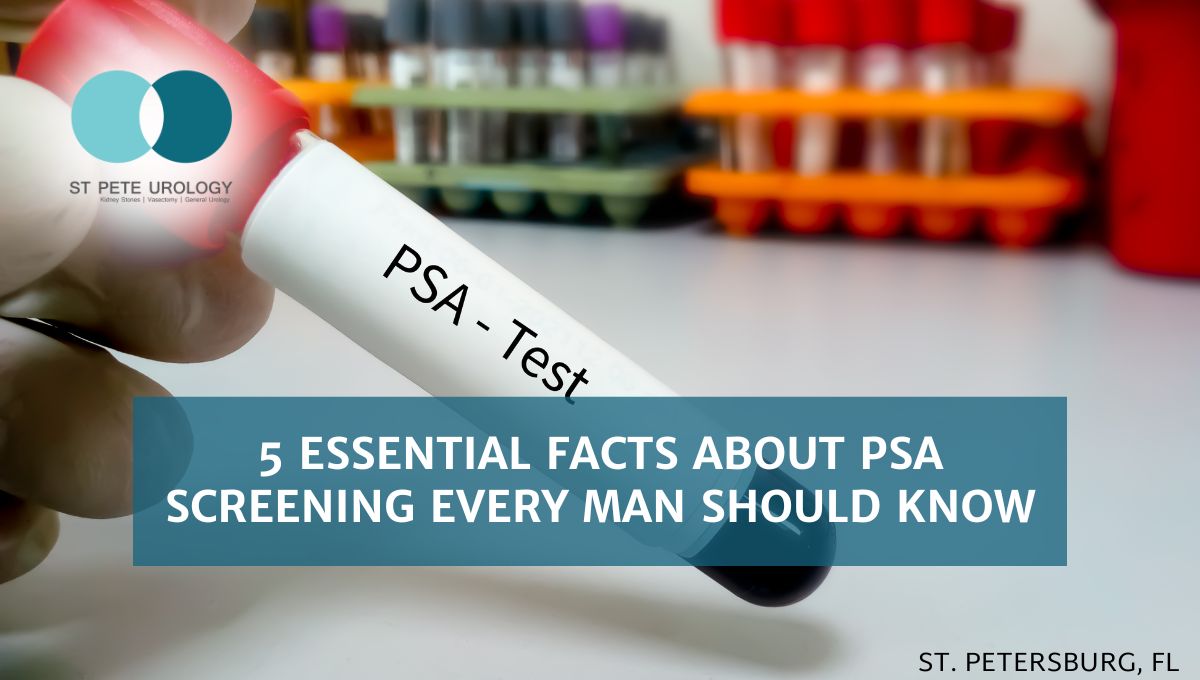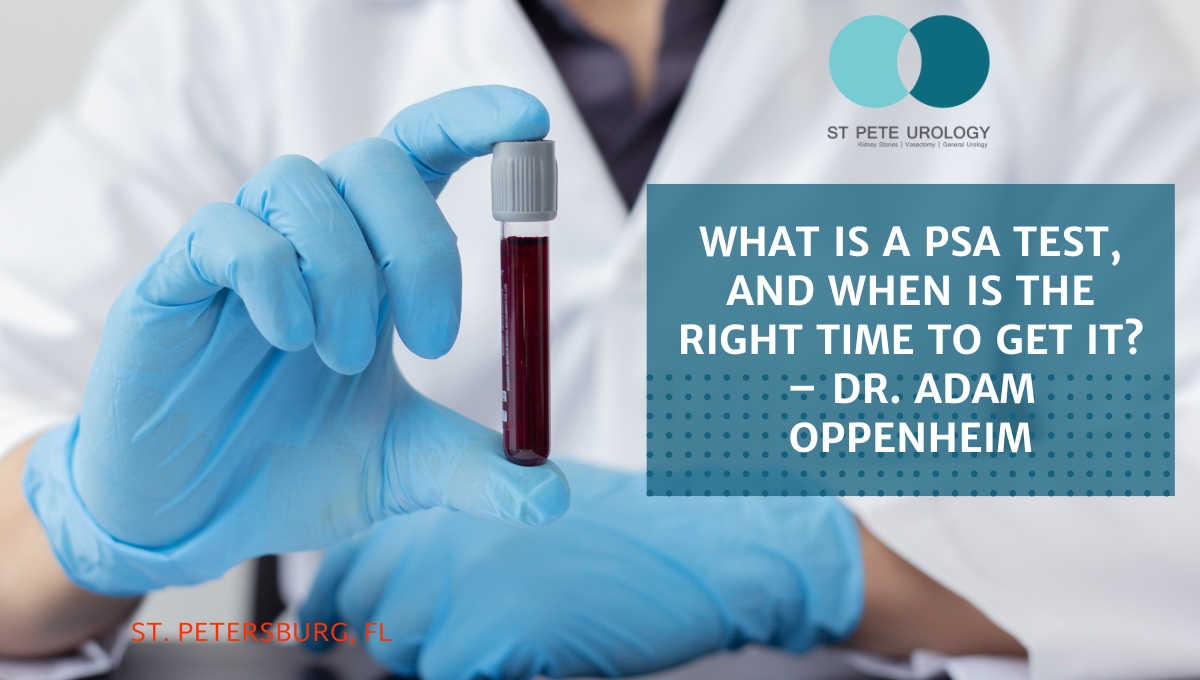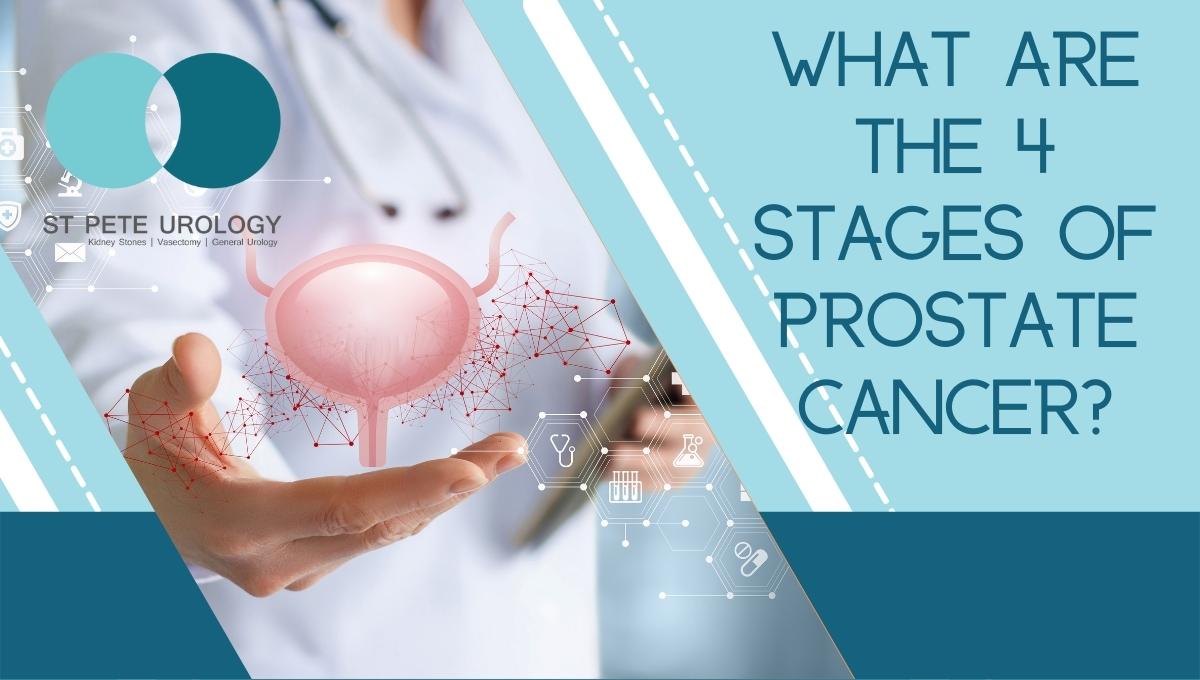Active surveillance offers low-risk prostate cancer patients a safe alternative to immediate treatment. Learn about monitoring protocols, eligibility criteria, and long-term outcomes from St Pete Urology’s experts.
Continue readingWhere & How to Get a PSA Test in St. Petersburg, FL & Nearby Labs
Getting a PSA test in St. Petersburg is straightforward—multiple labs across the city offer same-day walk-ins, and direct-to-consumer options eliminate the need for a doctor’s visit.
Continue reading5 Essential Facts About PSA Screening Every Man Should Know
Understanding PSA screening guidelines is crucial for prostate health. Learn who needs testing, when to start, and what your PSA numbers mean for early cancer detection.
Continue readingTreatment Options for Prostate Cancer Explained
Explore prostate cancer treatment options, from active surveillance to surgery, with insights tailored for St. Petersburg patients. Understand your choices.
Continue readingEarly Signs of Prostate Cancer: What Should Men Know?
Discover the early signs of prostate cancer, from urinary changes to subtle red flags, and learn when men in St. Petersburg should schedule screenings.
Continue readingCan Prostatitis Be Prevented and How?
Understand how can prostatitis be prevented and why is it significantly more beneficial than managing and treatment of the condition.
Continue readingWhat Are the Different Types of Prostate Problems? – Dr. Adam Oppenheim
Key Takeaways:
- There are two main types of prostate problems: Benign Prostatic Growth and Prostate Cancer.
- Early detection is key in managing and treating prostate cancer and should begin at age 50 (or 45 for those with a family history or higher risk factors).
- Treatment for both benign prostatic growth and prostate cancer depends on various factors and should be personalized to meet each patient’s unique needs.
Getting to Know Your Prostate
As the wise Dr. Adam Oppenheim says, “I’m a urologist with St. Pete Urology.” And who better to enlighten us on the different types of prostate problems than a seasoned professional? So, sit back and let’s delve into the world of prostate health.
First, let’s begin with some basics. The prostate is a walnut-sized gland located just below the bladder in men. Its primary function is to produce the fluid that nourishes and transports sperm. While this may seem like a small and insignificant part of the male anatomy, it can cause significant problems if not properly cared for.
Two Main Types of Prostate Problems
Dr. Oppenheim outlines two main issues in urology related to the prostate:
- Benign Prostatic Growth
- Prostate Cancer
Let’s take a closer look at each of these issues.
Benign Prostatic Growth: When Nature Takes Its Course
As Dr. Oppenheim explains, benign prostatic growth occurs when “patients have trouble urinating and they’re very bothered and often have to urinate very frequently or have a blocked stream.” This condition is known as Benign Prostatic Hyperplasia (BPH) and is a natural part of the aging process for men.
However, the symptoms of BPH can be quite bothersome, including:
- Frequent urination
- Difficulty starting and stopping urination
- Weak urine stream
- Dribbling of urine
While BPH is not life-threatening, it can significantly impact a man’s quality of life. Treatment options vary depending on the severity of symptoms and may include medications, minimally invasive procedures, or surgery.
Prostate Cancer: The Silent Threat
The second issue, prostate cancer, is a more sinister problem. Dr. Oppenheim informs us that “it doesn’t usually cause symptoms, but it can cause life-threatening cancer down the road if not treated.” This type of cancer occurs when malignant cells begin to grow uncontrollably in the prostate gland, often without any noticeable symptoms.
Early detection is key in managing and treating prostate cancer. Dr. Oppenheim suggests that men should begin screening for prostate cancer at age 50 (or 45 for those with a family history or higher risk factors). Regular screening tests, such as a prostate-specific antigen (PSA) blood test and digital rectal exam (DRE), can help identify any abnormalities in the prostate gland.
Choosing the Right Path: Customized Treatment Options for Prostate Problems
The course of treatment for both benign prostatic growth and prostate cancer depends on various factors, including the severity of the condition, age, overall health, and personal preferences. Dr. Oppenheim and the experts at St. Pete Urology offer personalized treatment plans designed to meet each patient’s unique needs.
For BPH, treatment options may include medication management, minimally invasive procedures, or surgery. For prostate cancer, treatment options can range from active surveillance (monitoring) to radiation or surgery, depending on the stage and aggressiveness of the cancer.
Conclusion: Trusting Your Prostate Health to St Pete Urology
Dr. Adam Oppenheim and the team at St Pete Urology in St Petersburg, Florida, understand the importance of early detection and customized treatment plans for men dealing with prostate problems. As Dr. Oppenheim says, “prostate health is a vital component of overall well-being, and we are here to help you navigate the complexities of this often-misunderstood aspect of men’s health.”
Don’t leave your prostate health to chance. Trust the urology professionals at St Pete Urology to provide the expertise and compassionate care you need. Schedule an appointment today and take control of your prostate health.
References:
- “Prostate disease – Better Health Channel.” https://www.betterhealth.vic.gov.au/health/conditionsandtreatments/prostate-disease.
- “Benign Prostatic Hyperplasia (BPH) – Urology Care Foundation.” https://www.urologyhealth.org/urology-a-z/b/benign-prostatic-hyperplasia-(bph).
- “Prostate Cancer: Types of Treatment.” https://www.cancer.net/cancer-types/prostate-cancer/types-treatment.
Transcription:
I’m Dr. Adam Oppenheim, I’m a urologist with St. Pete Urology.
So the prostate, there’s kind of two main issues in urology with the prostate.
There’s benign prostatic growth where patients have trouble urinating and they’re very bothered and often have to urinate very frequently or have a blocked stream.
And then there’s prostate cancer which is different and that doesn’t usually cause symptoms but it can cause life threatening cancer down the road if not treated.
What is a PSA Test, and When is the Right Time to Get It? – Dr. Adam Oppenheim
Key Takeaways:
- The PSA Test measures the levels of prostate-specific antigen (PSA) in a man’s blood and is used to screen for prostate cancer.
- When to get tested depends on your age and risk factors. For men aged 55-70 without high-risk factors, it is recommended to consider getting a PSA test.
- Early detection of prostate cancer is key to successful treatment, so speaking to your doctor about when to get tested is important in safeguarding your health.
Understanding the PSA Test
Ranked as the second leading cause of cancer deaths in men, prostate cancer demands serious attention. Yet, with early detection, many men can successfully overcome this potentially deadly disease. So, what precisely is a PSA test, and when should you consider undergoing one? Dr. Adam Oppenheim is a distinguished urologist at St. Pete Urology. He offers valuable insights into the significance of this vital diagnostic tool.
“A PSA is a blood test, it stands for the prostate-specific antigen, and it’s a blood test used in the screening of men for prostate cancer.” – Dr. Adam Oppenheim
Unveiling the PSA Test: How it Works
The PSA test measures the levels of prostate-specific antigen (PSA) in a man’s blood. This protein is produced by the prostate gland and is vital for the normal functioning of the prostate. However, elevated levels of PSA can be a red flag, indicating the possible presence of prostate cancer. It is important to note that other factors, such as age, medication, and inflammation, can also affect PSA levels.
When to Get Tested: Age and Risk Factors
The right time to start considering a PSA test largely depends on your age and risk factors. According to Dr. Oppenheim:
“Well, the guidelines recommend that screening for prostate cancer happen between the ages of 55 and 70 unless the patient has significant high-risk factors for prostate cancer, which are family history or being an African American.”
If you fall into this age range and have no high-risk factors, it’s time to think about getting a PSA test. However, if you have a family history of prostate cancer or are of African-American descent, consult your doctor. You should discuss the possibility of earlier screening to ensure proactive health management.
Treatment Options: Surgery vs. Radiation
When your PSA test reveals an elevated level of PSA, your doctor will probably recommend additional tests to confirm the presence of cancer. If cancer is indeed detected, the recommended treatment plan hinges on various factors. These factors include your age, as well as the stage of the cancer. It’s a comprehensive assessment that guides the most appropriate course of action.
“So it largely depends on how old the patient is, a younger patient is likely to be counseled to undergo surgery and have the prostate removed, whereas an older patient is probably more likely to be counseled to undergo radiation where they don’t have to have an inpatient setting of an operation and they can do treatments as an outpatient.” – Dr. Adam Oppenheim
Ultimately, whether you choose surgery or radiation treatment will be a personal decision made in consultation with your doctor.
Taking Control: The Importance of Early Detection
Prostate cancer is a serious medical condition, but with early detection, it can often be successfully treated. By understanding the PSA test and speaking to your doctor about when to get tested, you take an active role in safeguarding your health.
At St Pete Urology, a leading urology practice in St. Petersburg, Florida, their expert team is dedicated to helping you navigate your prostate health journey. From discussing your risk factors to offering guidance on treatment options, St Pete Urology accompanies you every step of the way. Their presence ensures that you receive the best possible care throughout your journey. Don’t leave your prostate health to chance. Reach out to the professionals at St Pete Urology today.
References:
- “Prostate-Specific Antigen (PSA) Test – NCI.” 11 Mar. 2022, https://www.cancer.gov/types/prostate/psa-fact-sheet.
- “What Are The Risk Factors? – Prostate Cancer Foundation.” https://www.pcf.org/patient-resources/family-cancer-risk/prostate-cancer-risk-factors/.
- “Radiation Therapy as Effective as Surgery for Prostate Cancer.” 9 Sep. 2021, https://www.cedars-sinai.org/blog/radiation-therapy-for-prostate-cancer.html.
Transcription:
I’m Dr. Adam Oppenheim, I’m a urologist with St. Pete Urology.
A PSA is a blood test, it stands for the prostate specific antigen, it’s a blood test used in the screening of men for prostate cancer.
Well the guidelines recommend that screening for prostate cancer happen between the ages of 55 and 70, unless the patient has significant high risk factors for prostate cancer, which are family history or being an African American.
So it largely depends on how old the patient is, a younger patient is likely to be counseled to undergo surgery and have the prostate removed, whereas an older patient is probably more likely to be counseled to undergo radiation where they don’t have to have an inpatient setting of an operation and they can do treatments as an outpatient.
What are the 4 stages of prostate cancer?
Key takeaways
- Prostate cancer starts in the prostate gland, but can spread outside of it if not detected and treated early.
- To confirm a diagnosis of prostate cancer and assess the stage of the cancer, doctors will use tests such as the PSA test and DRE, as well as a biopsy, ultrasound, MRI, and CT scans.
- The cancer is staged based on the size and spread of the tumor, with Stage I being the least advanced and having a high survival rate.
 Prostate cancer starts and grows in the prostate gland, but may spread outside the prostate, particularly when not detected and treated early. As it grows and spreads away from the prostate, the tumor may invade nearby tissues and consequently get carried via lymph nodes and lymph vessels traveling to distant tissues.
Prostate cancer starts and grows in the prostate gland, but may spread outside the prostate, particularly when not detected and treated early. As it grows and spreads away from the prostate, the tumor may invade nearby tissues and consequently get carried via lymph nodes and lymph vessels traveling to distant tissues.
Grading of prostate cancer
Prostate cancer is primarily screened using the prostate-specific antigen (PSA) test and the digital rectal exam (DRE). And when screening tests give abnormal results, your physician will run further tests to confirm the diagnosis, grade the cells, and then assess the stage of the cancer.
To confirm the diagnosis, your doctor will order a prostate biopsy. The test involves obtaining a sample of tissue from the most affected areas of the prostate and having the cells examined by a pathologist to determine if they are cancerous. And since cancerous cells appear different from healthy cells, the biopsy helps to confirm the diagnosis.
The appearance of cells is also used to grade the cancer. Usually, the cells are classified using the Gleason system, which uses the numbers 1 to 5 to grade the patterns of cells seen in the tissue sample as the most common (primary) and the second most common (secondary) patterns of cells.
Cells that look much similar to normal cells are given a score of 1, and then the scores 2-4 are given an increasing order of difference from normal ones. Therefore a score of 4 represents cells that are more different and have a higher chance of uncontrolled replication than a score of 2. And a score of 5 is given to cells that are completely different from normal prostate cells.
The total Gleason score is obtained by adding the primary and secondary scores, with the least tally that indicates cancer being 6—a score that shows a low-grade, least aggressive cancer. A Gleason score of 7 indicates a medium-grade cancer, while tallies of 8, 9 or 10 show a high-grade cancer.
Generally, the higher the score, the more the cancer cells appear different from normal prostate cells, and the more aggressive the cancer. Aggressiveness of a cancer means it has more chances of spreading to other areas of the body.
Today, the Gleason score is used alongside the grade group score to help stage prostate cancer. Other tests that help assessing the stage of prostate cancer include Transrectal ultrasound, prostate-specific antigen (PSA), MRI of the prostate, abdominal and pelvic CT scan to detect the potential spread of the cancer, nuclear scans to detect spread to bones, and surgical biopsy to check lymph nodes of your pelvis for the tumor.
So what are the stages of prostate cancer?
Staging of a prostate cancer means classifying the cancer according to how far it has spread and its effects on the prostate. The staging system helps in tailoring treatment to properly address the tumor.
To determine the stage of a cancer, your doctor will use a number of indicators. For instance, your doctor will use the TNM system, which has three different aspects. Tumor (T) describes the size of the main area of the cancer, nodes (N) identifies whether the cancer has spread to the lymph nodes and to what extent, while metastasis (M) describes how far from the prostate the cancer has spread.
Similarly, your physician will use the Gleason score and the grade group score to stage the cancer. The higher the Gleason or grade group score, the more aggressive and widely spread the cancer. Plus, your doctor will use the PSA level, ultrasound, MRI, CT scans, nuclear scans, and surgery to correctly stage the cancer.
- Stage I Prostate Cancer
The least advanced prostate cancer, usually small and not yet spread beyond the prostate, is called stage I prostate cancer. It is characterized by a PSA level that’s less than10 ng/mL, a Gleason score of 6, and a grade group score of 1. The cancer has a 5-year survival rate of almost 100 percent.
Stage I prostate cancer is managed by active surveillance for nearly all patients with a Gleason score of 6, unless the patient is unwilling or unable to undergo additional biopsies or has high-volume disease.
Active surveillance means your doctor monitors the tumor over time to check whether further treatment is necessary. Apart from active surveillance, stage I cancer may be treated using radical prostatectomy—the surgical removal of the prostate; or radiation therapy, either alone or with prostate removal.
- State II Prostate Cancer
The cancer is still restricted to the prostate and has not spread to the lymph nodes or other parts of the body. Also, it may or may not be felt during a prostate exam, though it may appear on ultrasound imaging.
Stage II prostate cancer has a PSA score of less than 20ng/mL, but is further divided into three phases depending on Gleason scores and grade group scores. Stage IIA has a Gleason score of 6 or less and grade group score of 1, stage IIB has a Gleason score of 7 (3+4) and grade group score of 2, while stage IIC has a Gleason score of 7 or 8 and grade group score of 3 or 4.
For stages IIA and IIB, active surveillance may be adequate. But, in some cases, doctors recommend removing the prostate together with the surrounding lymph nodes in order to prevent further spread of the cancer. Your doctor may also consider radiation therapy, in the form of external beam or brachytherapy.
For stage IIC, a combination of hormone therapy with radiation therapy in select patients—group grade 3 or those with more than 50-percent positive biopsy cores, usually gives great results.
- Stage III prostate cancer
At this stage, the cancer may or may not have spread outside the prostate. If the tumor hasn’t spread outside the prostate, the 5-year survival rate still remains close to 100-percent. But when the tumor has spread, the survival rate is reduced.
Stage III prostate cancer is divided into three sub-groups: IIIA, IIIB and IIIC. In stage IIIA, the cancer hasn’t spread outside the prostate, has a PSA level of 20ng/mL or higher, a Gleason score of 8 or less, and grade group score of 1 to 4.
Stage IIIB has spread outside the prostate and may have reached the seminal vesicles or the surrounding tissue, but it hasn’t reached the lymph nodes or other parts of the body. It may have any PSA level, but a Gleason score of 9 or 10, and grade group score of 5.
Stage IIIC prostate cancer may or may not have spread to the lymph nodes or other nearby organs. It has any PSA level, but a Gleason score of 9 or 10 and a grade group score of 5.
Stage III prostate cancer is treated through a combination of external beam radiation and hormone therapy. In some cases, brachytherapy or radical prostatectomy—with removal of pelvic lymph nodes—is considered. Active surveillance isn’t used for stage III prostate cancer because there is a higher risk of disease progression if not treated.
- Stage IV prostate cancer
This is the most advanced form of prostate cancer. The cancer has typically spread to distant parts of the body and affected several organs. Stage IV prostate cancer is divided into IVA and IVB. Stage IVA tumor has spread to nearby lymph nodes but hasn’t reached other areas of the body. Stage IVB tumor has reached distant lymph nodes and many other areas including bones or organs.
The treatments for stage IV prostate cancer include hormone therapy, chemotherapy, external beam radiation, targeted radiation and potentially prostate surgery.
Effective, state-of-the-art treatment
Successful treatment of prostate cancer depends on regular screening to increase the chances of early detection, correct grading of the cancerous cells, and proper staging of the cancer. Early detection ensures a higher survival rate just as the right staging ensures that the treatment administered is safe and effective.
At St Pete Urology, after a diagnosis, our skilled and experienced urologists select the right tests to determine the stage of the cancer. Then through a multidisciplinary approach, we provide a tailored treatment with the highest potential of achieving the best possible outcomes.
Call us today to book your screening, diagnosis and treatment of prostate-related problems. For more information on prostate cancer and other urological disorders, visit https://stpeteurology.com/
References
- “Prostate Cancer.” Mayo Clinic, Mayo Foundation for Medical Education and Research, mayoclinic.org/diseases-conditions/prostate-cancer/symptoms-causes/syc-20353087
- “Prostate Cancer Diagnosis.” Cancer.Net, American Society of Clinical Oncology, www.cancer.net/cancer-types/prostate-cancer/diagnosis
- “Staging.” American Cancer Society, www.cancer.org/treatment/understanding-your-diagnosis/staging.html
What are the key signs of prostate cancer?
Key takeaways
- Prostate cancer occurs when prostate cells grow and multiply uncontrollably, and can be malignant and life-threatening if it spreads to other parts of the body.
- Early-stage prostate cancer does not have any unique signs or symptoms and is difficult to detect, making regular screening and testing important for early detection.
- Common screening tests for prostate cancer include the PSA test and the DRE, and men who are 55-69 years old, African-American, or have a family history of prostate cancer should consider getting screened.
 The prostate is a tiny, walnut-shaped gland in the pelvis. Located near the bladder and felt through a digital rectal exam, the prostate produces the fluid that transports and nourishes sperm. The fluid—called seminal fluid—is squeezed out via the urethra during ejaculation.
The prostate is a tiny, walnut-shaped gland in the pelvis. Located near the bladder and felt through a digital rectal exam, the prostate produces the fluid that transports and nourishes sperm. The fluid—called seminal fluid—is squeezed out via the urethra during ejaculation.
What is prostate cancer?
Prostate cancer occurs in the prostate when prostate cells grow and multiply non-stop. The growth of the prostate can either be benign or malignant. Benign growth of the prostate, also called benign prostatic hyperplasia, is rarely a threat to life as it doesn’t invade tissues around your prostate, doesn’t spread, and can be removed or shrink back.
On the other hand, prostate cancer is a malignant growth that can spread to nearby organs like the bladder or rectum and is, therefore, a threat to life. This cancer can spread to other parts of your body and may grow back after removal.
When prostate cancer cells break away from the prostate, they can spread through lymph nodes or blood vessels to other parts of your body.
Upon spreading, the cancer cells attach to other tissues and grow to form new tumors that cause damage in the areas where they land.
Prostate cancer is one of the most common types of cancer.
Although most cases of prostate cancers grow slowly and are restricted to the prostate gland, where they tend to cause little harm, some types of cancer are aggressive, spread quickly, and are life-threatening.
What are the key signs of prostate cancer?
Early-stage prostate cancer doesn’t have any unique signs or symptoms. It starts in the outer areas of the prostate and grows slowly. These areas are away from the urethra, so the growing tissue mass does not press against the tube and affects your urination.
There are no early urinary signs of prostate cancer. When symptoms occur, they are usually related to the non-cancerous condition called enlarged prostate or another health condition.
Nevertheless, as the tumor grows and spreads, it begins to affect the organs around the prostate. So with time, it will eventually show signs as it breaks out of the gland (locally advanced prostate cancer) or spreads to other areas of the body (advanced prostate cancer).
Unfortunately, even late-stage prostate cancer shares signs with other urological disorders, making it difficult to tell whether it is due to cancer or other conditions, such as prostatitis or benign prostate enlargement (BPH).
That is why the key to establishing if you have prostate cancer is seeing a urologist, who will order tests to help find out what is causing the symptoms.
When they occur, the symptoms of prostate cancer include:
- Dull pain in the lower pelvic area
- Trouble starting to urinate or to empty your bladder
- Interrupted or weak urine flow
- Dribbling of urine after urinating or a feeling that the bladder hasn’t emptied properly
- Frequent urination, particularly at night
- Pain or burning sensation when urinating
- Difficulty having an erection, painful ejaculation, or decrease in the amount of ejaculate
- Blood in urine or semen
- Pain or pressure in the rectum
- Persistent pain in the back, hip, or pelvis
- Unexplained weight loss
- Bone pain
- Loss of appetite
Diagnosis of prostate cancer
Prostate cancer is highly treatable when detected early. But for the condition to be discovered early, frequent screening is necessary.
Screening means you undergo testing even though you have no symptoms. The prostate-specific antigen (PSA) test and the digital rectal examination (DRE) are the most commonly used screening tests. Both help detect cancer early, although they aren’t perfect tests.
Speak with your urologist about whether or not you should undergo screening. Your doctor will assess your degree of risk and decide whether you should have the PSA test and the DRE. Generally, you should be screened if you are 55-69 years or older, African-American male, or have a family history of prostate cancer.
If the screening tests show that you might have cancer, your doctor will recommend a biopsy for confirmation. The decision to have a biopsy is based on the PSA and DRE results. Your doctor will also consider family history, ethnicity, and other health factors.
At St Pete Urology, we offer screening, diagnosis, and treatment of prostate cancer. Through our patient-centered, compassionate approach to care, we have ensured that most of our at-higher-risk clients are enrolled in screening.
We have employed a collaborative, multidisciplinary approach that ensures all our patients get the best possible care.
Call us today for more information on prostate cancer and other urology disorders.
References
- “Prostate Cancer.” Cancer Council Australia, cancer.org.au/cancer-information/types-of-cancer/prostate-cancer
- “Prostate Cancer Symptoms.” Cancer Center, www.cancercenter.com/cancer-types/prostate-cancer/symptoms
- “Prostate cancer testing.” Better Health Channel, Department of Health & Human Services, Victoria, Australia, www.betterhealth.vic.gov.au/health/conditionsandtreatments/prostate-cancer-testing










